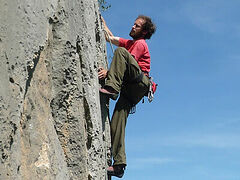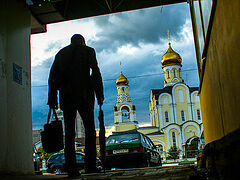The Stanley Cup, the most prestigious annual hockey tournament of modern time, is over... The final buzzer is heard and players rush to the ice to congratulate one of the main heroes of the final series—the Russian goalie Sergei Bobrovsky. The stadium is like a seething cauldron of emotions. An extravaganza on the ice and in the locker room; a multi-million-viewer audience—16.3 million people in North America alone. Amidst this unbelievable fuss, Bobrovsky gives his first interview as a champion and says, “I thank God for it all! I am nothing without Him.”
If you analyze the vocabulary of Russian hockey players during their laconic interviews they give abroad, we can compile a paper-thin vocabulary—not more than two or three hundred words. And we’re not talking here about a poor knowledge of English or the inability to express thoughts. No, it is more about professional requirements on top of a high-endurance physical load that takes all their strength and drains the athlete emotionally. The union of athletes overseas actively advises the sportsmen that it is worth refraining from any speeches that would at least give a hint to those who are seeking to find something. You often get the impression that it is enough to memorize a single line, or maybe two—and they’ll be enough to cover all the briefings, media scrums and press conferences. “A worthy opponent,” “highly skilled players,” “tough challenge,” “a great opportunity to play here,” “excellent support.” And that’s pretty much it—all you need to do is to mix them up when, according to your contract, you have to complete the required press time. That’s why any player literally understands that his every word is worth its weight in gold, and you must answer for every word you say there.
It often happens that behind this wall of professional clichés, you can glean what’s really bothering these guys—it is reflected in their behavior during the most crucial and heart-pounding moments. It is enough simply to look at our hockey players mere moments before the referee’s signal. The whole arena plunges into darkness, the anthem is sung… To quiet their excitement, the hockey players chew gum, shuffle to and fro on ice and shift their weight on the skates... But the Russian players, the goalies in particular, for some reason, truly stand out during such moments when everyone is trying to defuse tension.
Helmet in hand, head tilted slightly forward with the torso held upright, the mouth often hidden behind the jersey collar, their eyes remain closed or they stare down at the ice… When the camera literally snatches a few shots of our Russian players, you can see that they are praying. These moments are especially noticeable when they are noticed repeatedly from game to game.
A viewer can only guess about the prayer, but when the goalkeeper makes the sign of the cross after it—everything becomes clear
A viewer can only guess about the prayer, but when the goalie, like, say, the renowned Igor Shesterkin, makes a wide sign of the cross later, everything becomes clear. Or, as it was during Bobrovsky’s interview—it turns out that in that truly joyous moment, the most exciting time of his life (it’s enough just to look at the players when they live through a moment of their long-awaited, hard-won triumph), he talks about God. His confession is brief and terse, but the very demeanor of the Russian goalie—on and off the ice—speaks of his sincerity.
For Sergei Bobrovsky, this Cup was the first in his long career (and he is thirty-five). He has been recognized more than once as the best goalie in the world, but it was his first won trophy. Besides, the universal recognition was already long gone. His glorified status was replaced by reproaches and even ridicule—his failures and injuries fueled many critics to accuse him of not living up to his status, to send the Novokuznetsk native to the roles of backup in his teams or even to have him retire. To some extent, Sergei joined his team’s starting lineup by chance: Spencer Knight, a young talent in American hockey and Sergei’s teammate at the Florida Hockey Club, was injured.
“I want to dedicate my victory to Him,” Bobrovsky concluded at the beginning of his post-victory interview, slightly raising his right hand towards the sky.
Russian hockey players keep mum about their personal life, and religiosity in particular, as you could have guessed already, but it still shows. It’s hardly possible to see them not wearing a cross, even in the locker room or during a tense match. Sometimes photos or snippets from interviews leak online and it becomes clear that, for example, Kirill Kaprizov—one of the most promising players of our time—has become a godfather or went to church; or Andrei Vasilevsky, who shares the palm of superiority as the best goalie in the world with Bobrovsky, has received a blessing from His Holiness the Patriarch; or that Pavel Datsyuk, whose name was added to the World Hockey Hall of Fame this year for his virtuosity, openly calls himself an Orthodox Christian and defends family values. These examples could go on and on, including the story of Ivan Provorov, a Russian defenseman from Columbus Blue Jackets who refused to wear a “rainbow” jersey and explained that he does not support LGBT movement (an organization banned in Russia) because of his adherence to the Orthodox faith.
It should be said that not only Russian hockey players are supporters of family values: just look at those who come on the ice along with players of this winning streak or other important games—and you will immediately recognize families: large families with children, along with grandparents, generations of athletes... What strikes you there is that there are players who have Russian last names: for example, Matthew Tkachak. He may be known as Tkachak, but his jersey shows his name as Tkuchuk. His ancestors, it seems, moved to America from the Russian Empire, and now his whole family is connected with hockey—his dad and a brother are famous hockey players. They come out on the ice. Another player is also Russian, although he is Finnish by nationality (he has dual citizenship, both Finnish and Russian)—Alexander Barkov. His father was a Soviet hockey player, and his home has a feel of a Russian household. “When I leave my house, I’m Finnish, but when I return, I’m Russian,” Barkov once said. These days, everyone considers him one of the best players in the world, the second Sergei Fedorov. This Russian lad stands out for his modesty, respectful demeanor and strong work ethic. His colleagues overseas marvel at Barkov’s training load, endurance, and mastery—but he will surely be quick to praise someone else at a media scrum and point out some of his own shortcomings or thank his team. He always wears a cross on his neck, as well. Last year, for every assist and every goal he made, he donated a sizable contribution to benefit the disabled children. But, as everyone should understand, he does score quite a bit—he scored twenty-three winning goals and fifty-seven assists this past season, not counting that same victorious Stanley Cup win.
Florida snatched a victory in the final series from an incredibly strong team, Edmonton. None other then Gretzky, the best hockey player of all time, once played there. Talking one day about his Canadian city and the team of the same name, Wayne (who, by the way, also has Russian ancestors) said: “There are only three important things here: Church, family, and hockey.”




